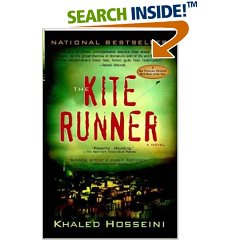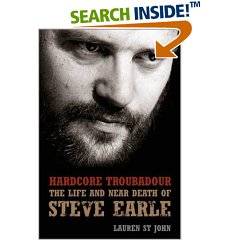
The Kite Runner, by Khaled Hosseini on amazon.com
Reader Rating: 10/10
Salaam! Have just finished yet another incredibly moving and insightful novel on Afghanistan and its history and culture and peoples: The Kite Runner, by Khaled Hosseini. BTW--I got this book as a new hard cover on amazon.com's "New & Used" for about $10 with shipping; there's one listed now for $7.57 + shipping on amazon.com and at abebooks.com there is a paperback version listed for $5.51 + shipping.
This is another book born out of the real-life experience of an Afghan who grew up in the "good old days" under the rule of King Zahir Shar, prior to the first coup staged by the king's cousin Daud in 1973, which in turn led to the communist take-over, the Soviet occupation, the years of bitter internecine mujahedin civil war, and the rise & fall of the Taliban. The story evolves out of the deep, yet tragic, relationship between a young privileged Pashtun boy growing up in Kabul and the son of his father's Hazara servant. The sad history of rival ethnic relations between the Pashtun and Hazara is painstakingly evident, though I believe the novel ultimately attempts to break down the wall of separation (& discrimination) that has existed for so long between these two groups. There is a glimmer of hope by the novel's end, though the agonizing events up to that point have given little reason to expect it.
Kite flying and fighting and "running" (chasing and capturing other kites whose strings have been cut) are one of the factors at the heart of the deep bonds the two boys develop; these activities are also at the heart of the resulting tragic developments in their relationship. Story reading/telling, a father's influence on his son, and a rather "cowardly" search for some sort of redemption are another factors at play in the main character's life--and along the way there are some wonderful insights into the complexities of Afghan family and social life.
This is a story of sin, loss, deception and redemption told in a genuine voice that stirs the soul at very deep levels. A skillfully told first story from a writer whom I trust we will hear much more from in the near future.
-------------
The Kite Runner
By Khaled Hosseini
Riverhead, $24.95
368 pages, ISBN 1573222453
The unforgettable, heartbreaking story of the unlikely friendship between a wealthy boy and the son of his father’s servant, The Kite Runner is a beautifully crafted novel set in a country in the process of being destroyed. It is about the power of reading, the price of betrayal, and the possibility of redemption. And it is also about the power of fathers over sons -- their love, their sacrifices, their lies.
The first Afghan novel to be written in English, The Kite Runner tells a sweeping story of family, love, and friendship against a backdrop of history that has not been told in fiction before, bringing to mind the large canvasses of the Russian writers of the nineteenth century. But just as it is old-fashioned in its narration, it is contemporary in its subject -- the devastating history of Afghanistan over the past thirty years. As emotionally gripping as it is tender, The Kite Runner is an unusual and powerful debut.
Read Chapter One
==============================================
"Here’s a real find: a striking debut from an Afghan now living in the US. His passionate story of betrayal and redemption is framed by Afghanistan’s tragic recent past . . . Rather than settle for a coming-of-age or travails-of-immigrants story, Hosseini has folded them both into this searing spectacle of hard-won personal salvation. All this, and a rich slice of Afghan culture too: irresistible."
==============================================
An Afghan hounded by his past
Khaled Hosseini's shattering debut work, The Kite Runner, is the first novel to fictionalise the Afghan culture for a Western readership
Amelia Hill
Sunday September 7, 2003
The Observer
In this, apparently the first Afghan novel to be written in English, two motherless boys who learn to crawl and walk side by side, are destined to destroy each other across the gulf of their tribal difference in a country of dried mulberries, sour oranges, rich pomegranates and honey.
It's a Shakespearean beginning to an epic tale that spans lives lived across two continents amid political upheavals, where dreams wilt before they bud and where a search for a child finally makes a coward into a man. The Kite Runner is the shattering first novel by Khaled Hosseini, an Afghan doctor who received political asylum in 1980 as civil conflict devastated his homeland.
Whatever the truth of the claim to be the first English-language Afghan novel, Hosseini is certainly the first Afghan novelist to fictionalise his culture for a Western readership, melding the personal struggle of ordinary people into the terrible historical sweep of a devastated country in a rich and soul-searching narrative.
Over the last three decades, Afghanistan has been ceaselessly battered by Communist rule, Soviet occupation, the Mujahideen and a democracy that became a rule of terror. It is a history that can intimidate and exhaust an outsider's attempts to understand, but Hosseini extrudes it simply and quietly into an intimate account of love, honour, guilt, fear and redemption that needs no dry history book or atlas to grip and absorb.
Amir is a privileged member of the dominant Pashtun tribe growing up in affluent Kabul in the Seventies. Hassan is his devoted servant and a member of the oppressed Hazara tribe whose first word was the name of his boy-master. The book focuses on the friendship between the two children and the cruel and shameful sacrifice the rich boy makes of his humble, adoring alter ego to buy the love of his own distant father. 'I ran because I was a coward,' Amir realises, as he bolts from the scene that severs his friendship with Hassan, shatters his childhood and haunts him for the rest of his life. 'I actually aspired to cowardice.'
The book charts Amir's attempts to flee culpability for this act of betrayal, seeking asylum from his hellish homeland in California and a new life buried deep in black velvet portraits of Elvis. Amir's story is simultaneously devastating and inspiring. His world is a patchwork of the beautiful and horrific, and the book a sharp, unforgettable taste of the trauma and tumult experienced by Afghanis as their country buckled.
The Kite Runner is about the price of peace, both personal and political, and what we knowingly destroy in our hope of achieving that, be it friends, democracy or ourselves.
=============================
"If you're not standing on the Edge,
you're taking up too much room."
=============================












